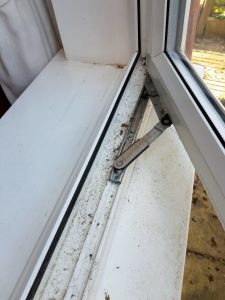Maintenance for your locks
It’s that time of year again when the weather starts to do funny things to our doors. I am already being called out to do jobs that could be avoided with some basic maintenance for your locks.
Here on the Norfolk Coast, locks are not only at risk of rusting, but also damage from sea salt and wasps (more on those later).
So what can you do to avoid having to call me, or at least make the call a bit cheaper?
Firstly, keep your door (and window) locks clean. It’s very easy to forget about the front edge of a door when it is shut while you clean, but I see some shocking sights in my work. The more dirt and dust is allowed to build up, the more it finds its way into the working parts of your lock eventually causing damage.
The next step is oiling your locks. There is a lot of argument in the locksmithing world as to whether WD40 or graphite is better. For me, I say WD40 used twice a year (every time you change your locks is an easy way to remember and perfect for changes in weather) works just fine because it coats and flushes at the same time. Oiling does not mean just squirting a bit of oil where you put your key in the lock. If you have a wooden door with a mortice (“Chubb” type) lock, then the part inside stops the oil getting to where is needed and if you have a lock with a “Yale” type key, then oil in the key way is only getting a tiny percentage of what needs to be oiled. If you have any lock with a latch, either pull the handle down or rotate any lever knob to retract that latch. If you look where the latch retracts, you will see that the wedge shape of the latch will create a perfect gap for you to put in the straw provided with cans of WD40. Squirt for about 5 seconds (10 seconds if first time) and then work the handles, etc a few times to get the oil all over the insides.
On doors with multipoint locking systems (eg UPVC doors) you should also look at the front edge and lift the handles up and down a few times. Give another squirt of oil to anything you see moving. When you do this, you might even find the sticker that tells you to oil the door that you never knew was there and the installer never told you about! If you have a wooden door with a single deadlock, unscrew the faceplate at the front and take it off. This will now give you a larger gap around bolt. You might have to hold the WD40 straw in one corner, but squirt what you can, being aware you might get some splash back at you and oil does not clean up from clothes easily, so no maintenance in your wedding dress/designer suits. Don’t forget to put the face plate back on afterwards. In all cases, put some rags on the floor as oil will run down and drip off the bottom of the door and WD40 even stains paving stones.
Once you have done all the above, keep an eye on how difficult your door is to open. Hotter summers are warping even doors that never recognisably warped before. If your door is becoming difficult to operate in any way, there will be undue stress on various parts of your lock which will eventually lead to something breaking. The most common problem last year was French doors shrinking away from each other and the hooks of the multipont mechanisms not being able to get into their slots. Multipoint mechanism doors are usually adjustable, if your door is not as easy to operate when closed as it is open, best get the door adjusted before something breaks and you will have to add a locking product on to the cost of the adjustment.
Finally, those pesky wasps. If you have a wooden door with a multipoint locking system (lift the handles to lock) and it does not have top and bottom bolts, there will be a gap at the top behind the metal faceplate. This gap runs down behind the faceplate as far as the first moving part you can see. It is the perfect size for wasps to make cells in which to grow more baby wasps. Those cells harden a lot and can cause the mechanism to break. My advice is to at least put insect repellent all over the top of the door and then maybe stick a small cotton wool ball just in the top to bar access. I’ve dealt with a few of these cases now, and I really don’t like angry wasps trying to get me while I destroy their hard work!
If you have any questions regarding the above information, please don’t hesitate to get in touch by phone, text or email.
Thanks for reading.



